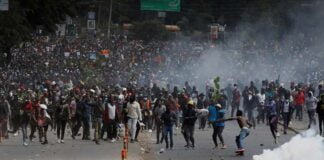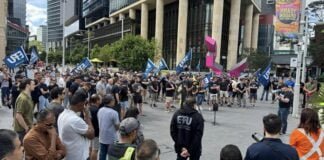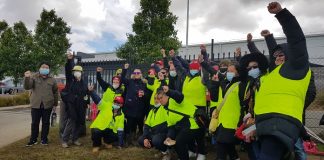Kyriacos Banos is a member of Solidarity’s sister organisation in Greece, the Socialist Workers Party (or SEK). He spoke to us about the escalation of workers’ struggle in Greece.
Can you give us some of the political background to the current situation in Greece?
Since the austerity measures started from January 2009 and from January 2010 when the government entered into agreements with the “troika” [the IMF, the European Union, and the European Central bank] they have tried to present the cuts as necessary.
They said the Greek working class and the Greek government together could not do anything but implement the cuts to wages, unemployment and the cuts to public services like hospitals, schools and welfare. They claimed that it was a special and exceptional crisis in Greece due to the high cost of the public sector wages and a lack of competitiveness in the Greek economy.
What sort of resistance did Greek workers offer at that stage?
The first strike on 17 December 2009 was small. It was organised by smaller unions. Only 3000 workers marched in Athens. The big union confederations of both the public and private sectors did not want to support it … they were saying that the austerity measures were “medicine for Greek society.” The president of the big private sector confederation said Greek workers wanted no strikes.
[But] the austerity measures of the ruling class were failing to solve the crisis. They said they would cut benefits only once, now all benefits have been cut. They promised that the first cut to the [public service] salaries would be for one month. Now the cuts are permanent. They said they wouldn’t fire people in the public sector. Now they have sacked 150,000 public sector workers. What the government does every three or four weeks is announce new cuts, new taxes and new privatisations.
As the attacks got worse did the workers begin to sense there was a political crisis going on?
At first workers were talking about issues like cuts to benefits and cuts to wages. But some groups of workers started to speak about more political issues. They started to say, “we don’t want a troika involved in Greece.” This happened from January 2010 when we had the first big strike supported by the unions. People became aware that the attacks were not just directed at their individual jobs and wages, they recognised it as an attack on all workers. They began to connect the battles on an ideological and political level. They now understand that this is a European and international crisis.
So what about the last three months, has that political development increased?
The Arab spring and Spain helped to internationalise the crisis in the eyes of the mass of Greek people. That inspired the occupation of Syntagma Square [in Athens]. People were even waving Spanish flags outside of the Greek parliament… It helped give a new coordination to the mass of people who wanted to organise themselves and not wait for the leadership of the government or even the trade unions.
People were meeting every day in the square and having political discussions. They were not always politically clear. Some had autonomous politics. But it was clear that they were all against the form of democracy that the government offered them.
Were the trade unions involved in Syntagma Square movement?
Yes. The three most important days in Syntagma coincided with general strikes on 15 June and June 28 and 29. The movement of the working class became mixed with the occupation of Syntagma Square. After that at the base of the unions, within work places, people started to organise their own committees. In those committees they started organising the battles with their own workplaces and within the unions.
So the union leadership was being pulled along behind the rank-and-file workers at that point?
Yes, exactly. They started coordinating with other committees in other workplaces. The biggest example was the strike yesterday [5 October]. That strike was pressed to the union officials by members working in hospitals, schools, municipalities and the big companies involved in transportation and electricity.
Where do the union leaders stand politically?
Around 60 per cent of the unions in the public sector are tied to the ruling social democratic party (PASOK), like a Labor party. The big public-sector strike on October 5, which was built from below, forced those union bureaucrats to come out and say, “from now on we are at war with the government.” This happened because we have had the … workers committees.
[The] committees were voted for at the general assemblies of workers and were intended not to work apart from the unions but within them. We believe this is a shift towards workers control within each workplace. So far it has only within the public sector and at a relatively small level.
Workers in several government ministries coordinated to occupy their buildings on the same day and to have common demonstrations.
How has SEK been involved in the movement?
We sell our newspaper [Workers’ Solidarity] in over 450 workplaces around Greece.
After 2005 the party went through a transition. From a youth organisation, we became more of a workers organisation … our student members became workers, we developed a presence within several public sector unions. We could argue for general assemblies and strikes and so on.
We have the analysis that social democratic parties don’t genuinely represent workers’ interests. Now that the support base of those parties is beginning to politically separate from the leadership we are in a position to push our ideas. We are the main organisation pressing for workplace committees. What we are saying is that you, the workers, must organise yourselves in your own workplaces with your own demands but at the same time have the political aims of the whole working class as part of your agenda. And in doing this you are laying the first bricks to build a society to take us out of this crisis. We are trying to make these arguments in every workplace that we have members. Our arguments are that to end the crisis we must drop the debt, nationalise the banks, stop the sackings and tax the rich.
Because of the relationships we have built over the last 25 years in various campaigns … people are willing to trust our ideas. The Anti-Capitalist Front [of which SEK is a part], got 100,000 votes in the last municipal election.
What role are students playing within the party?
The aims of student campaigns has been to stop the privatisations of universities, to keep businesses out of universities. But the shift we have seen in the recent wave of university occupations is that students … now see openly and clearly that the attack against students is connected to the attacks on every other section of society. The students asked for support from the workers. They wanted connections with the unions of the lecturers and teachers including those in schools. So we saw at the recent strikes the students demonstrating and protesting together with the education unions and other workers across the public sector. Our student members argue in the assemblies that there is no other way to stop the privatisations of the universities other than to continue the connections with workers unions.





